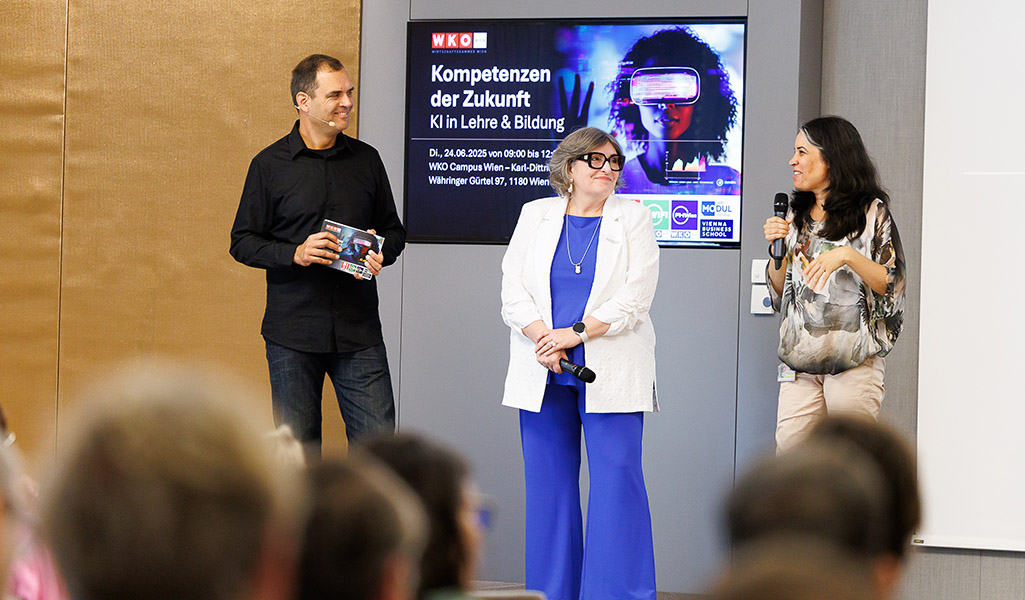AI has long since arrived in teaching and education—but does it really help? Four studies by FHWien as part of the research project “AI in educational sector of the Vienna Chamber of Commerce” show where tools are useful, where they cause confusion—and why good collaboration often yields more than technology alone.
With the technical possibilities offered by ChatGPT and similar tools, awareness of the limitations and challenges of using AI tools is growing – among learners and teachers alike. These are the findings of the studies, which are based on a learner survey and experiments with learners, as well as focus groups with teachers and a comparative discourse analysis. To this end, the researchers surveyed learners and teachers at the University of Applied Sciences and WIFI Vienna, as well as the MODUL tourism schools and the Vienna Business School in the 2024/25 winter semester.
AI use in school and university – sometimes with unease
The survey of over 1,500 school and university students paints a clear picture:
- AI is used intensively in everyday school and university life – especially for summarizing and translating texts, as a writing aid, and for brainstorming.
- The most frequently cited reasons for using AI were time savings and the higher quality of the results achieved.
- There were differences between the age groups: while university students like to use AI tools for text optimization, school students tend to use them as learning aids.
- Some respondents expressed concern that AI would make them too comfortable or cause them to forget how to think for themselves. One student reported that it “felt strange” to present AI-generated content as her own work.
In the experiment, good teamwork beats AI use
As part of the research project, teams of learners worked on complex tasks in six experiments – with or without AI. The result: success depended less on the use of AI than on clear communication, role allocation, and mutual assistance. For example, one team without AI achieved better results than another with AI support because it was well organized. On the other hand, artificial intelligence helped teams come up with innovative ideas, such as using solar panels not only to generate electricity but also to cool buildings by casting shade.
For project manager Tilia Stingl de Vasconcelos Guedes, “such studies are essential in order to be able to respond quickly and purposefully to developments in the field of generative AI in education.” According to the university professor, “we still know too little about the long-term effects of AI on people, society, and the future.” For her, however, there is no question “that we want to actively address the challenges. This requires motivated employees and learners to use the technology in a way that contributes to quality of life. Studies like this provide the necessary guidance.”
AI awareness – more than just prompting skills
The research project was supplemented by an analysis of public discourse on AI skills in German-speaking countries. According to this analysis, the demand on employees’ AI skills are increasing significantly. Not only is application knowledge such as prompting in demand, but also analytical thinking, judgment, information literacy, and ethical awareness. To keep pace with the dynamic development of the topic, IMWF Management- und Wirtschaftsforschung GmbH analyzed publicly available media, social media, and websites in two twelve-month periods, first in 2023/24 and then in 2024/25.
During the observation period, the following aspects of professional AI use became particularly important:
- AI awareness – understanding the possibilities and limitations of artificial intelligence
- AI-informed decision-making – the reflective integration of AI results into professional decisions
- Data protection and legal framework – the frequency of relevant media reports and discussions has increased sevenfold since 2023
According to the discourse analysis, the education sector plays a key role in dealing with AI – even ahead of healthcare, management, and administration. This applies not only to the application of AI skills, but also to their teaching.
Seven tasks for educational institutions
For Barbara Kluger-Schieder, Head of Education Management at the WKW, the studies paint a nuanced picture of the challenges facing schools, universities, and course providers when it comes to the hot topic of AI: “The project results show how important the human factor is when using AI. Analytical thinking, teamwork, and ethical awareness are just as crucial as technical knowledge. The educational institutions of the Vienna Economic Chamber take this into account—both internally and in their training and continuing education programs.”
To use AI tools sensibly, efficiently, and in compliance with the law, the researchers recommend that educational institutions tackle the following tasks:
- Expand technical infrastructure
- Clarify legal framework conditions
- Provide practical training for teachers
- Promote critical media literacy
- Further develop teaching methods
- Strengthen teamwork and social dynamics
- Share best practice examples
>> Further information about the project “AI in educational sector of the Vienna Chamber of Commerce”
